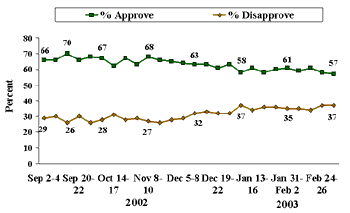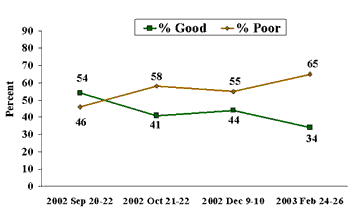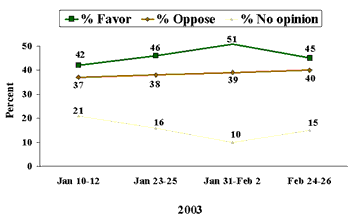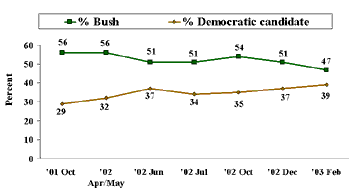GALLUP NEWS SERVICE
PRINCETON, NJ -- The popularity of President George W. Bush has slipped over the past several months amid lower public ratings of the economy and uncertainty over when a war with Iraq might begin. But his declining popularity would appear to be related more to the economy than war, as support for a U.S. invasion of Iraq has remained fairly steady over this period, while public ratings of the economy have plummeted. In that time, Bush's approval rating has dropped by about 10 percentage points. The latest CNN/USA Today/Gallup poll also shows that for the first time since 9/11, support for Bush's re-election against an unnamed Democratic candidate has fallen below the 50% mark among registered voters.
The poll, conducted Feb. 24-26, finds 57% of Americans expressing approval of Bush's overall performance in office, just a point lower than a week ago, but 10 points below the average approval rating he received in September of last year and the lowest since 9/11. Bush's current rating is exactly the same as the average rating he received in the first 7 months of his administration, although his ratings had been falling just prior to the terrorist attacks. A Sept. 7-10, 2001 Gallup Poll showed Bush with an approval rating of 51%.
| George W. Bush's Job Approval Rating Over Past 6 Months |
 |
The poll also finds that 59% of Americans support an invasion of Iraq, little changed from the readings Gallup has taken over the past 6 months -- which have averaged 57% in favor of war, varying from a low of 52% to a high of 63%. But over the same period, the public's rating of the economy has plummeted.
| Public Rating of Economy |
 |
Six months ago, in September, Americans thought the economy was good rather than poor by a margin of 54% to 46%. In October and December, the majorities were reversed, with more people giving a poor than a good rating by 58% to 41%, and 55% to 44%, respectively.
The latest readings show an even worse assessment. By close to a 2-to-1 margin, 65% to 34%, the public says the economy is in poor shape.
Public Dubious About Bush Economic Plan
This past January, the news media reported on Bush's economic plan, designed to jump-start the economy and allay the public's fears about a worsening situation. But the public has reacted with less than overwhelming support.
| Support for Bush Economic Plan |
 |
Initially, the public was mostly divided, leaning in support of the plan by a slim margin, 42% to 37%, with 21% uncertain. After Bush's State of the Union address on Jan. 28, the public seemed to rally somewhat around Bush's ideas, expressing support by 51% to 39%. But the latest ratings show the public almost evenly divided again, leaning in favor by just 45% to 40%.
Bush Re-Election Indicator Falls
The declining ratings of the economy appear to be having an effect not only on Bush's overall approval rating, but on the president's potential electoral support.
| Election 2004: Bush or Democratic Candidate? (Among Registered Voters) |
 |
Among registered voters, Bush's support is now at 47%, just 8 points more than the support expressed for an unnamed Democrat. A rule of thumb for an incumbent is that any figure below the 50% mark signals trouble.
The current numbers suggest that the rally effect of 9/11 has greatly diminished. A month after the terrorist attacks, registered voters supported Bush over the unnamed Democratic candidate by 27 percentage points. Today, the margin is just 8 points.
Clearly, the current figures are not predictive of what will occur in November 2004, because much can happen between now and then, and much depends on the actual person who eventually will win the Democratic nomination. But it's clear that the two most volatile situations currently facing the Bush administration -- a possible war with Iraq and the economy -- are likely to have a profound effect on Bush's re-election chances.
While no one can predict with certainty how important each issue will be, the elder President Bush discovered in 1992 that his record-high approval rating following the Gulf War did not overcome the public's disfavor with the economy. The current situation with President George W. Bush is eerily reminiscent of the situation his father faced a dozen years ago.
Survey Methods
The latest results are based on telephone interviews with 1,002 national adults, aged 18 and older, conducted Feb. 24-26, 2003. For results based on the total sample of national adults, one can say with 95% confidence that the margin of sampling error is ±3 percentage points. In addition to sampling error, question wording and practical difficulties in conducting surveys can introduce error or bias into the findings of public opinion polls.
If George W. Bush runs for re-election in 2004, in general are you more likely to vote for Bush or for the Democratic Party's candidate for president?
|
|
Democratic candidate |
OTHER |
No |
|
|
% |
% |
% |
% |
|
|
George W. Bush |
||||
|
National Adults |
||||
|
2003 Feb 24-26 |
46 |
40 |
4 |
10 |
|
2002 Dec 16-17 |
49 |
37 |
4 |
10 |
|
2002 Oct 3-6 |
52 |
35 |
2 |
11 |
|
2002 Jul 29-31 |
50 |
34 |
3 |
13 |
|
2002 Jun 21-23 |
51 |
36 |
3 |
10 |
|
2002 Apr 29-May 1 |
56 |
31 |
3 |
10 |
|
2001 Oct 5-6 |
54 |
29 |
2 |
15 |
|
Registered Voters |
||||
|
2003 Feb 24-26 |
47 |
39 |
4 |
10 |
|
2002 Dec 16-17 |
51 |
37 |
3 |
9 |
|
2002 Oct 3-6 |
54 |
35 |
1 |
10 |
|
2002 Jul 29-31 |
51 |
34 |
3 |
12 |
|
2002 Jun 21-23 |
51 |
37 |
3 |
9 |
|
2002 Apr 29-May 1 |
56 |
32 |
3 |
9 |
|
2001 Oct 5-6 |
56 |
29 |
2 |
13 |
|
George H.W. Bush^ |
||||
|
(NA) 1992 Jan 31-Feb 2 |
46 |
38 |
-- |
16 |
|
(NA) 1992 Jan 3-9 |
42 |
41 |
-- |
17 |
|
(NA) 1991 Dec 5-8 |
48 |
34 |
-- |
18 |
|
(NA) 1991 Nov 21-24 |
48 |
36 |
-- |
16 |
|
(NA) 1991 Oct 31-Nov 3 |
46 |
36 |
-- |
18 |
|
(NA) 1991 Oct 10-13 |
49 |
32 |
-- |
19 |
|
(NA) 1991 Sep 13-15 |
51 |
29 |
-- |
20 |
|
(NA) 1991 Sep 5-8 |
52 |
29 |
-- |
19 |
|
(NA) 1991 Aug 23-25 |
55 |
27 |
-- |
18 |
|
(NA) 1991 Jun 13-16 |
51 |
30 |
-- |
19 |
|
(NA) 1991 Apr 25-28 |
51 |
30 |
-- |
19 |
|
(NA) 1991 Mar 7-10 |
67 |
17 |
-- |
16 |
|
(NA) 1991 Feb 14-17 |
54 |
33 |
-- |
13 |
|
(vol.) Volunteered response |
||||
|
(NA) National Adults |
||||
|
^ 1991-1992 WORDING: If George Bush runs for re-election in 1992, in general are you more likely to vote for Bush or for the Democratic Party's candidate for president? |
||||
Turning to the economy,
How would you rate economic conditions in this country today -- as very good, somewhat good, somewhat poor, or very poor?
|
Very |
Somewhat |
Somewhat |
Very |
No |
|
|
% |
% |
% |
% |
% |
|
|
2003 Feb 24-26 |
3 |
31 |
43 |
22 |
1 |
|
2002 Dec 9-10 |
3 |
41 |
41 |
14 |
1 |
|
2002 Oct 21-22 |
3 |
38 |
42 |
16 |
1 |
|
2002 Sep 20-22 |
5 |
49 |
35 |
11 |
* |
|
2002 Jul 26-28 |
5 |
46 |
37 |
12 |
* |
|
2002 Jun 28-30 |
5 |
53 |
33 |
9 |
* |
|
2002 Apr 5-7 |
6 |
55 |
30 |
9 |
* |
|
2002 Jan 11-14 |
7 |
50 |
32 |
10 |
1 |
|
2001 Dec 14-16 |
5 |
45 |
37 |
12 |
1 |
|
2001 Sep 21-22 |
7 |
50 |
34 |
8 |
1 |
|
2001 Apr 20-22 |
10 |
57 |
25 |
7 |
1 |
|
2001 Feb 9-11 |
16 |
64 |
16 |
3 |
1 |
|
2001 Jan 15-16 |
24 |
58 |
14 |
4 |
* |
|
2000 Jun 6-7 |
39 |
46 |
9 |
5 |
1 |
|
2000 Mar 10-12 |
42 |
44 |
10 |
3 |
1 |
|
1999 Jun 25-27 |
34 |
50 |
10 |
6 |
* |
|
1999 Jan 8-10 |
41 |
48 |
8 |
3 |
* |
|
1998 Jul 7-8 |
29 |
50 |
15 |
5 |
1 |
|
1998 Jan 25-26 |
24 |
57 |
14 |
4 |
1 |
|
1998 Jan 24-25 |
24 |
57 |
13 |
5 |
1 |
|
1998 Jan 23-24 |
24 |
57 |
15 |
4 |
* |
|
1997 Oct 27-29 |
24 |
55 |
15 |
4 |
2 |
|
1997 Aug 22-25 |
17 |
52 |
21 |
9 |
1 |
|
* Less than 0.5% |
|||||
Based on what you have read or heard, do you favor or oppose Bush's economic plan?
|
Favor |
Oppose |
No opinion |
||
|
% |
% |
% |
||
|
2003 Feb 24-26 |
45 |
40 |
15 |
|
|
2003 Jan 31-Feb 2 |
51 |
39 |
10 |
|
|
2003 Jan 23-25 |
46 |
38 |
16 |
|
|
2003 Jan 10-12 ^ |
42 |
37 |
21 |
|
|
^ |
Asked of a half sample |
|||
